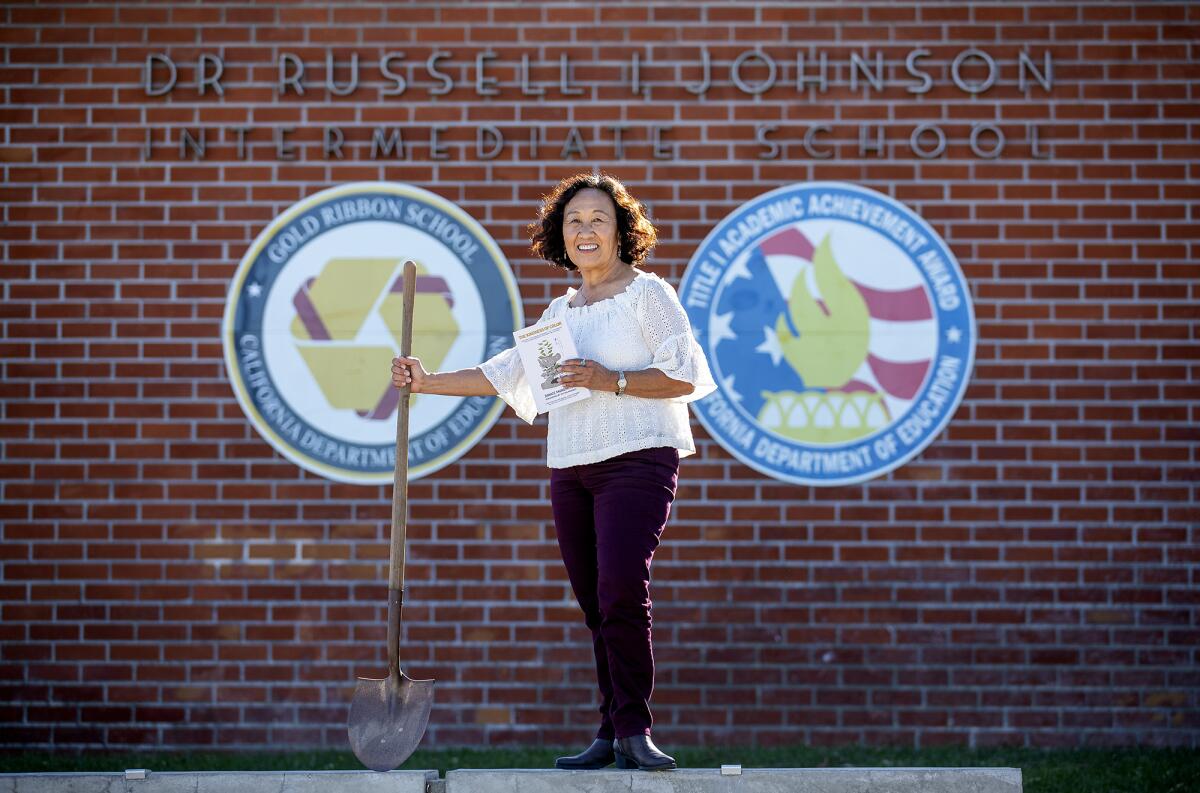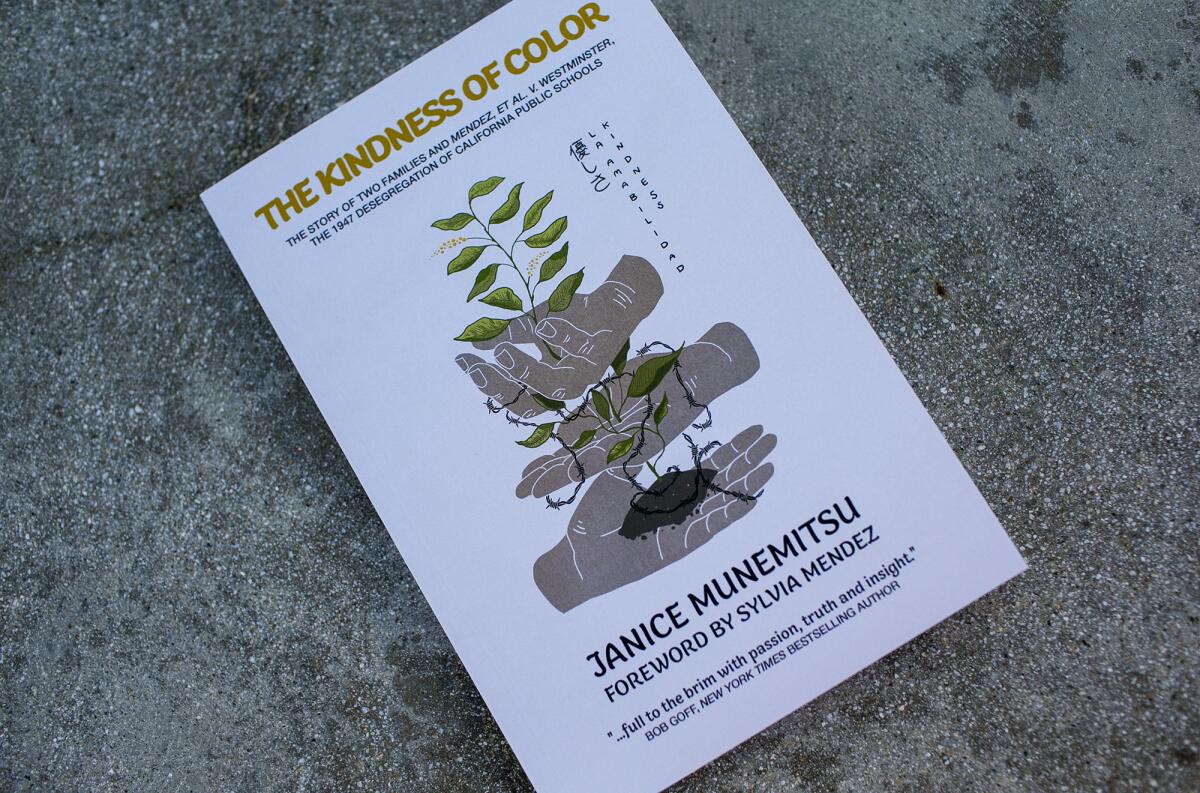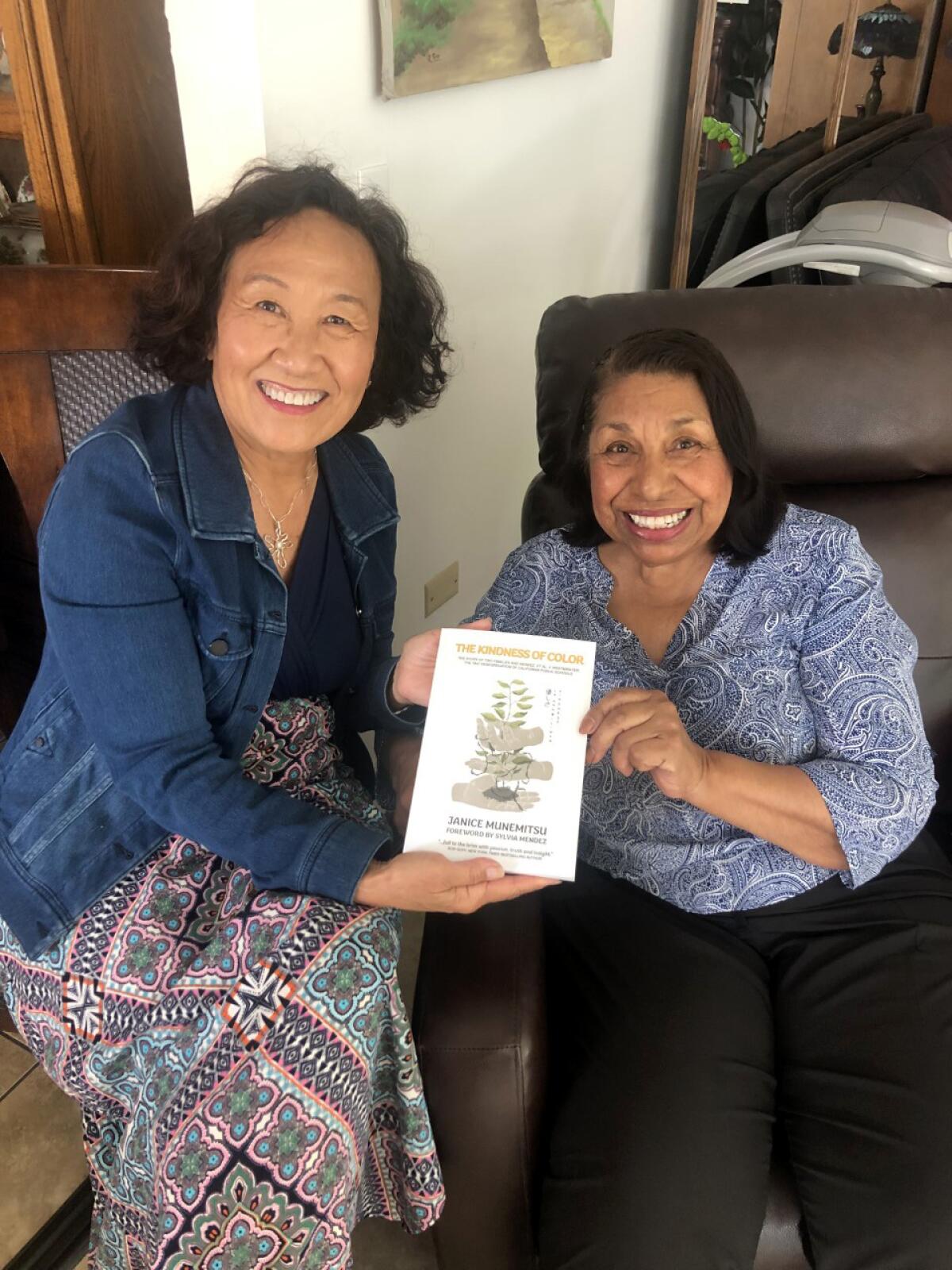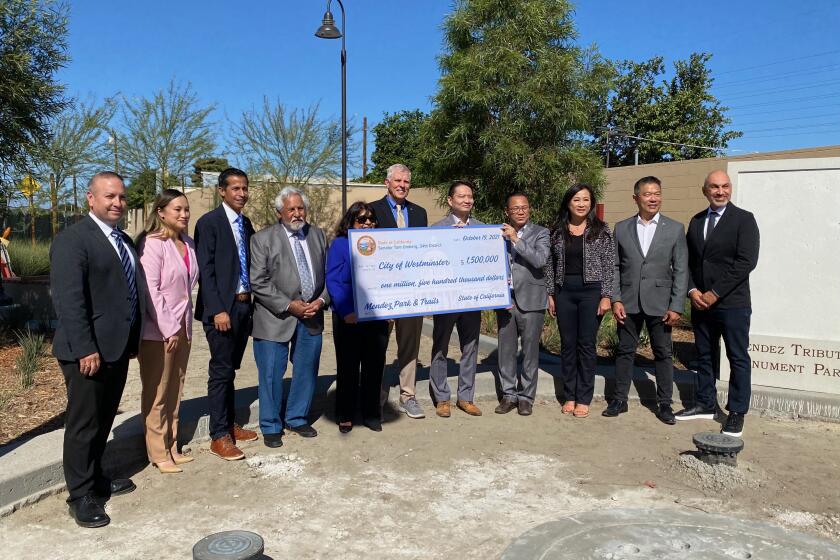New book details how two O.C. families and a farm helped integrate public schools

- Share via
A Japanese American family’s modest farm in Westminster once harvested much more than just asparagus, strawberries and tomatoes. Its fields were also woven into the story of Mendez, et al v. Westminster, one of Orange County’s most famous civil rights cases.
Janice Munemitsu, whose father owned the farm, recounts the tale in her newly published book, “The Kindness of Color: The Story of Two Families and Mendez, et al v. Westminster, the 1947 Desegregation of California Public Schools.”
It’s a history she didn’t fully know at first.
Munemitsu was aware that the 40-acre farm was leased when her family was forced into World War II-era internment camps, which she argues in the book are better understood as “incarceration camps,” since they operated outside the bounds of legal protections for prisoners of war.
The lease of the property “enabled my family to keep it after my grandfather, grandmother, dad and aunts came back,” she said. “But I didn’t know the Mendez name.”
State Sen. Tom Umberg presented a $1.5-million check to help further the construction of the 2-mile historical trail.
As Munemitsu recounts in her book, answering a cold call in 2002 made the connection. Sandra Robbie, who was working on a PBS documentary about the case at the time, asked prodding questions to make sure she found the right family member.
Once confirmed, the filmmaker explained how Gonzalo Mendez, a cantina owner from Santa Ana, signed a formal lease agreement and moved his family to the farm. When the new school year started in 1944, his Mexican-Puerto Rican children weren’t allowed to enroll in a white school in Westminster and had to attend a Mexican one. Gonzalo decided to take the Westminster School District of Orange County to court over the segregating snub.
The case became a class-action suit when Thomas Estrada, William Guzman, Frank Palomino and Lorenzo Ramirez joined as co-plaintiffs against school segregation in Santa Ana, Garden Grove, and Orange as well.
Mendez used the profits from the farm’s harvests to help cover legal fees associated with the case. An appellate court upheld a ruling in favor of the families in 1947.

Munemitsu soon met with Gonzalo and Felicitas Mendez’s three children, Sylvia, Gonzalo Jr. and Jerome, after learning of their shared history. She appeared in Robbie’s “Mendez vs. Westminster: For All the Children / Para Todos los Niños,” and later joined Sylvia Mendez as a public ambassador of the case’s history.
During one such presentation in 2019, Munemitsu and Mendez noticed a particularly receptive audience at the New Jersey headquarters of Prudential Insurance.
“We were just struck by how many people loved the story of the families’ connection,” she said. “We also spoke at the Orange County Department of Education and again we got a similar reaction.”
Dr. Jeff Hittenberger, then serving as chief academic officer for the department of education, noticed the response as well and encouraged Munemitsu to write a book.
“Every person in Orange County, and certainly every student, should know this story,” said Hittenberger, now a Vanguard University professor. “In a time of division and incivility, Munemitsu shows how people of all backgrounds can work together, act with kindness and courage, and help our nation live up to its commitments to equality, justice, and democracy.”

Despite some initial hesitation, Munemitsu began jotting her family’s stories down and interviewed Sylvia Mendez to fine-tune the history. Writing through the pandemic, the effort resulted in a makeshift manuscript that she honed and self-published last month.
“The Kindness of Color” weaves through the two families’ immigrant stories and the discrimination they faced. Because of the California Alien Land Law of 1913, Munemitsu’s grandfather, a noncitizen, couldn’t own the Westminster farm. A family friend who was a U.S. citizen stepped in and became the legal guardian of Seiko “Tad” Munemitsu, his young son, who was then allowed to own it.
Kindness often served as a catalyst against such injustices. Munemitsu dedicated a chapter to Frank Monroe, a banker who connected the Mendez and Munemitsu families together through the lease.
“If Monroe hadn’t gone that extra step to get to know Gonzalo on a more personal level, he would’ve never have known that he always wanted to be a farmer,” Munemitsu said. “If Monroe hadn’t taken the time to mentor my father as a young boy in business so that my grandfather could understand what needed to happen, this history wouldn’t have happened.”

Such meditations on kindness serve as a through line, even as the chapters offer a harrowing personal history of her family’s time away at an incarceration camp in Poston, Ariz.
The story of Japanese Americans and their incarceration in internment camps as well as Mexican Americans and school segregation, “The Kindness of Color” fills an important void. Even though Mendez, et al v. Westminster is part of the state’s curriculum, educational resources about the case are scant.
Munemitsu’s book arrives ahead of the 75th anniversary of the appellate court’s ruling next year as the planned Mendez Freedom Trail in Westminster remains under construction. She hopes her work finds its way to young people, especially, as a reminder that simple acts of kindness can forward the cause of justice.
“As I’ve talked to people, they’re looking for a story that gives them reasons to hope,” Munemitsu said. “Whatever you can do has a ripple effect.”
All the latest on Orange County from Orange County.
Get our free TimesOC newsletter.
You may occasionally receive promotional content from the Daily Pilot.





